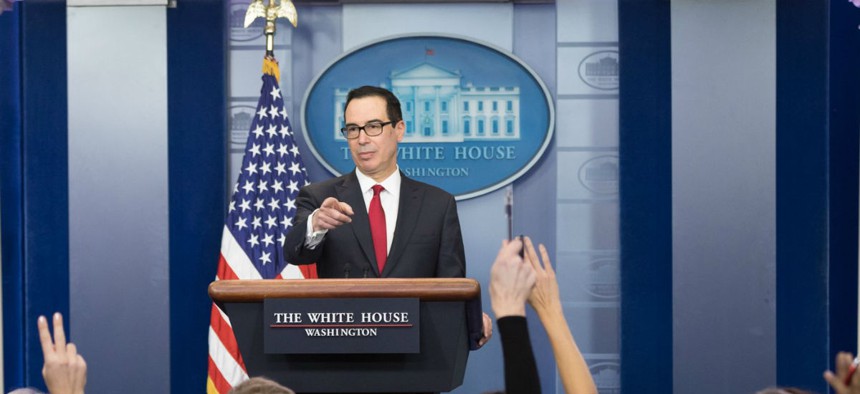
Treasury Secretary Steve Mnuchin took questions from reporters at the White House in January. Official White House Photo by Andrea Hanks
Treasury To Take ‘Extraordinary Measures’ as U.S. Hits Debt Ceiling Saturday
Those measures are likely to involve tampering with funding for federal employee benefits.
The federal government will hit its borrowing limit on Saturday, but the Treasury Department is prepared to take its usual precautions to buy time for lawmakers to work out a deal to raise or suspend the debt ceiling.
Congress last suspended the debt ceiling in February 2018, in a bipartisan budget deal that temporarily removed the borrowing restriction through March 1, 2019. The government will not face an immediate crisis, however, as Treasury will implement its standard “extraordinary measures” to give itself as much leeway as possible to continue borrowing and pay its bills.
Those measures typically include a suspension of daily reinvestments into the Thrift Savings Plan’s government securities (G) Fund, as well as investments into the Civil Service Retirement and Disability Fund and the Postal Service Retiree Health Benefits Fund. All of those funds would ultimately be made whole once the debt ceiling is again raised or suspended. For now, however, Treasury will only suspend the sale of State and Local Government Series securities to buy time, department Secretary Steve Mnuchin said in a letter to congressional leadership last week. He added “it is likely Treasury will utilize additional extraordinary measures as well.”
Those measures, in addition to the surplus of revenue expected in April when federal taxes are due, “should allow the Treasury to finance the government’s normal operations for several months without an increase in the debt ceiling,” the Congressional Budget Office said in a report this week. Treasury will “probably have sufficient cash” to make all of its usual payments until “late into the fiscal year,” CBO said, adding that “an earlier or later date is possible.”
Congress is looking to put off the issue until it has to set fiscal 2020 spending levels. Federal agencies are currently funded through Sept. 30. Sen. Chuck Grassley, R-Iowa, chairman of the Senate Finance Committee, recently told Bloomberg congressional action “probably won’t be until Oct. 1,” saying it is preferable to make the discussion “part of the budget negotiations.” He suggested they will not start until the summer.
Rep. Richard Neal, D-Mass., chairman of the House Ways and Means Committee, sent a letter to Mnuchin in January concerning the debt ceiling and cautioned that tax revenues may be less than expected this year due to the disruption to Internal Revenue Service operations during the 35-day government shutdown, as well as the tax reform law President Trump signed into law in 2017. Neal asked for a firm date from Mnuchin on when his committee, and Congress, would have to take action.
The U.S. government has never defaulted on its obligations, so it remains unclear exactly what the fallout would be if Congress fails to act. A default could result in furloughs or delayed paychecks for federal employees. The scenario would “lead to delays of payments for government activities, a default on the government’s debt obligations, or both,” CBO said.
NEXT STORY: TSP Returns Mostly Positive in February







